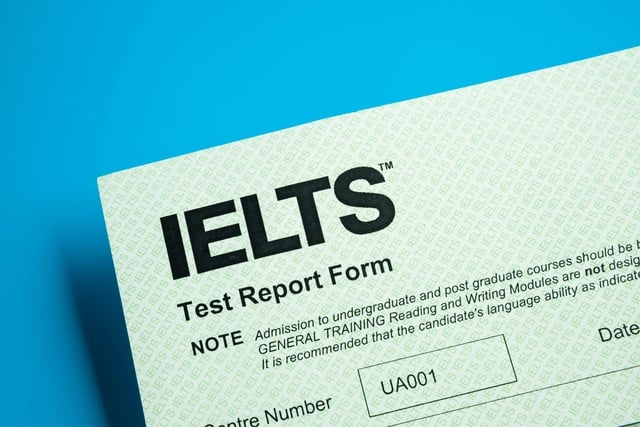
More Vietnamese people have IELTS scores of 7.0 or higher than before
PHOTO: SHUTTERSTOCK
5% of candidates achieved IELTS 8.0 or higher
IELTS co-organizers recently released global IELTS test score data for 2024-2025. Although Vietnamese candidates maintained the same average IELTS Academic score of 6.2 as in 2023-2024, they dropped one place compared to last year - to 29th out of 40 countries that administer the IELTS test. This position is equal to Nepal and Thailand, of which Thailand in 2023-2024 only achieved an average score of 6.1 and ranked one place behind Vietnam.
The average score of 6.2 is also the result of the 2022 statistical period, but at that time Vietnam ranked 23rd. This means that although the average score of the IELTS Academic test was 6.2 for many consecutive years, Vietnam's ranking has continuously decreased, in the context of the number of countries surveyed being increasingly expanded.
Accordingly, the IELTS scores of Vietnamese people in the listening, reading, writing, and speaking skills in the latest statistical period were 6.5, 6.4, 6.1, and 5.6, respectively. Compared to 2023-2024, the average speaking score increased slightly, from 6.3 to 6.5; the reading score remained the same while the writing and speaking scores decreased slightly by 0.1. Compared to the world average, the listening and writing scores of Vietnamese candidates were higher (6.4 and 6.0) while the reading and speaking scores were lower (6.7 and 6.4).
In terms of score ratio, the most popular score for Vietnamese people is 6.0 (21%), followed by 6.5 (18%) and 5.5 (17%) - almost the same as the previous statistical period (levels 6.0 and 6.5 are both 21% and 18%, while level 5.5 decreased by 1% compared to 2023-2024). In addition, data from IELTS also shows that 0% of Vietnamese candidates achieved the maximum score of 9.0, possibly because the number of people achieving this mark is not representative enough to be statistically significant.
Another notable point is that the proportion of candidates in the high-score group increased, while the proportion in the low-score group decreased - a trend completely opposite to the previous year. Specifically, in 2024-2025, 30% of candidates scored from 4.0-5.5, down 4% compared to the previous year but still not equal to the level in 2022 (29%). Meanwhile, at the 6.0-7.5 level, the proportion this year is 62%, last year it was 61%. And at the 8.0-8.5 level, both measurement times gave the same result of 5% of candidates.
In addition, the rate of Vietnamese candidates achieving IELTS 7.0 or higher in the latest statistical period was 28%, or more than 1/4 of the total number of candidates and an increase of 5% compared to last year. Of these, only 1% of candidates achieved the 8.5 mark. At the 9.0 mark, Thanh Nien has recorded many cases such as Mr. Le Khanh Hoang, Mr. Nguyen Hoang Huy, Mr. Luyen Quang Kien, Mr. Nguyen Trung Duc, Mr. Dang Tran Tung, Ms. Ta Hoa, Ms. Truong Hai Ha, Ms. Nguyen Huong Ngoc Quynh...
It should be noted that the above statistical results do not represent the general ability of IELTS candidates in Vietnam because a person can retake the test an unlimited number of times, according to experts.
How do other countries take the IELTS test?
Compared to other countries in the Southeast Asian region, the average IELTS Academic score of Vietnamese people is behind some countries such as Malaysia (7.1), Philippines (6.8), Indonesia (6.7), Myanmar (6.6) but higher than Cambodia (6.0). In addition, in Asia, Vietnam's score is higher than China (5.9) and Japan (5.8). In general, the average IELTS Academic score of the world ranges from 5.4 (Oman) to 7.6 (Germany).
In addition, in 2024-2025, 78.93% of candidates worldwide registered for the academic test, while the rest chose the general test (used for immigration purposes or to apply for a work permit abroad). Of the total number of candidates, women registered for the test at a higher rate of 53.11%, while men accounted for 46.89%. In both the academic and general tests, women scored higher on average than men.
Previously, the report on foreign language teaching and learning in Vietnam in 2023 conducted by the Vietnam Institute of Educational Sciences and the National Foreign Language Project Management Board pointed out that the age of IELTS test takers of Vietnamese people is getting younger. Specifically, in 2018, only nearly 1.5% of candidates were aged 16-18 and more than 13% were in the 19-22 age group. After 5 years, the proportion of the 16-18 age group accounted for 30%, an increase of 20 times, while the 19-22 age group increased more than 2 times.
A study published in the English Today magazine in April by Mr. Tran Thanh Vu (Durham University, UK) synthesized many analyses of the IELTS "fever". In the above work, the author pointed out that the number of IELTS testing centers, the quality of teaching in public schools, and the policy of using IELTS for university admission or previously exempting high school graduation English exams are some of the important factors promoting the IELTS test preparation trend.
"The IELTS race has created an unhealthy trend in English teaching and learning in Vietnam, while widening the socio -economic gap between students in different regions," the study warned.
IELTS (International English Language Testing System) is an international English language testing system recognized by thousands of governments, universities and businesses worldwide. The exam was launched in 1989 and is currently jointly owned by IDP, British Council and Cambridge Assessment English. According to statistics from test organizers, over 2 million candidates take the IELTS exam worldwide every year.
Source: https://thanhnien.vn/diem-trung-binh-ielts-cua-nguoi-viet-tut-hang-hon-1-4-dat-tu-70-tro-len-185250826132818314.htm














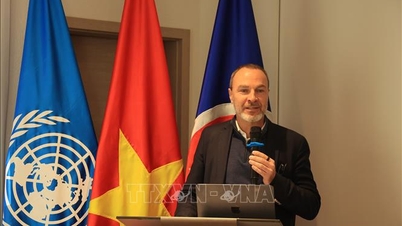

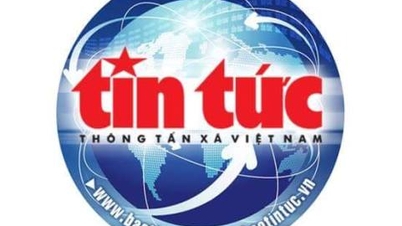












































































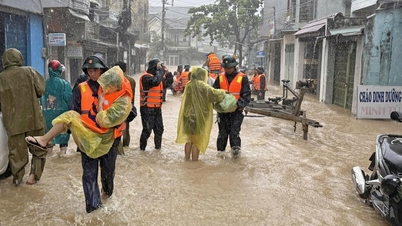
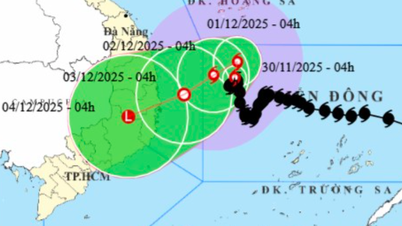














Comment (0)